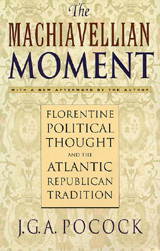Classics Series
J.G.A. Pocock’s Machiavellian Moment: Florentine Political Thought and the Atlantic Republican Tradition (1975)
When asked about a classic work of history that had influenced me and deserved our continuing attention, I knew at once my reply was J.G.A. Pocock’s The Machiavellian Moment: Florentine Political Thought and the Atlantic Republican Tradition. During the late 1970s I was researching the Gilded Age generation of social thinkers in the United States and uncertain about how to frame their thought. It was easy enough to see them as socializing liberalism or scientizing social thought or professionalizing their intellectual work, that is to see them in the light of what their project became in the 20th century. But how did they relate to the past? When I read MM, I realized that their particular idiom had emerged from the republican tradition and that theirs was the same project that had occupied republican thinkers for centuries – to secure the virtuous republic in time.
I realized as well that Pocock had enormously expanded and deepened the range of American political thought. American political culture had hitherto largely been grounded in a shallow view of Lockean liberalism, famously by Louis Hartz, and the newer work by Bernard Bailyn and Gordon Wood had only begun to plumb the implications of republicanism. Pocock gave us a much richer and more complex intellectual domain to explore. In three areas, particularly, MM made major contributions and still offers us a lot to learn: political ideology, discourse analysis, and historical consciousness.
The issue of whether American political culture was fundamentally republican or liberal was the one that most exercised my generation of historians. Initially, contemporary political concerns faced-off republican proponents of the “public good” and participatory democracy against ever-present liberals and market values. Pocock had bracketed liberalism and initially dismissed it where it intruded, thus opening the way for an either-or analysis.
The deeper consequence of his work, however, was to lead intellectual historians to look  more carefully at the multiple languages and logics of American political culture, and to examine how their divergences and convergences played out over time. Pocock himself had made clear that Protestant, romantic and republican ideas had interacted in important ways. James Kloppenberg produced an analysis of the “intermingling of religious, republican, and liberal themes” during the Revolutionary era that has stood the test of time. (JAH, June 1987) Rogers Smith’s Civic Ideals proved the value of that approach through the nineteenth century by parsing the ways liberalism and republicanism interacted in setting the parameters of citizenship, and by adding the missing languages of race and gender that formed an ascriptive strain of political discourse. In our age of ideology, intellectual historians have restored close readings of the languages of conservativism and neoliberalism. Pocock still offers a model of how to analyze the logics that allow these languages to join with and work against the other strands of political thought.
more carefully at the multiple languages and logics of American political culture, and to examine how their divergences and convergences played out over time. Pocock himself had made clear that Protestant, romantic and republican ideas had interacted in important ways. James Kloppenberg produced an analysis of the “intermingling of religious, republican, and liberal themes” during the Revolutionary era that has stood the test of time. (JAH, June 1987) Rogers Smith’s Civic Ideals proved the value of that approach through the nineteenth century by parsing the ways liberalism and republicanism interacted in setting the parameters of citizenship, and by adding the missing languages of race and gender that formed an ascriptive strain of political discourse. In our age of ideology, intellectual historians have restored close readings of the languages of conservativism and neoliberalism. Pocock still offers a model of how to analyze the logics that allow these languages to join with and work against the other strands of political thought.
Current historians, however, no longer tend to describe their work as the study of political “languages” or “discourse.” Critics at the time objected to what seemed Pocock’s linguistic determinism – historical actors could only speak the languages they had learned – despite his demonstration that in response to different intellectual and political circumstances, they spoke those languages in ways that created substantially new meanings. In a multi-lingual world, his 18th century Scots were quite able to draw new implications from the clash of liberal and republican languages. Pocock affirmed the “relative autonomy” of individual agents, and MM rested on a theory of speech acts that made the thinker an agent who pursues political purposes and constructs as she responds to the political world. (For Pocock’s most considered statement of his method, see “The State of the Art,” in Virtue, Commerce, and History, 1985.)
More recently, however, the focus on discourse has lapsed because the temper of interpretation in the American academy has moved in poststructuralist and culturalist directions. What has increasingly interested intellectual historians is the different ways ideas are used in the culture under examination not the way long-term social and intellectual structures define ideas and their uses. Discourses exert structural force, in Pocock’s hands a “soft” structuralism grounded in the contexts and contingencies of history. Within that fluid medium, political languages persist over time because the premises that shape them, the questions at their center, and the projects they define persist. The poststructuralist, culturalist temper is producing marvelous new intellectual histories, but they leave room for attention to the mix of long-term continuity and change that discourse analysis provides. Indeed, a good deal of what intellectual historians still do could fit within that model and be sharpened by consideration of the language, questions, and purposes that discourse analysis highlights.
That brings me to the final feature of MM I want to highlight. What particularly struck me in Pocock’s work – and what still seems to me his most underappreciated contribution – was his central concern with historical time. Pocock’s basic premise – elaborated in his essays in Politics, Language, and Time – was that political languages carry with them a society’s ‘historical consciousness’ (80) and with that its “understanding of itself.” (233) Because politics constitutes a nation’s public life and deals with emergent events, uncertain consequences, and institutional legitimacy, political languages must deal with contingency and continuity. In the process, they construct a nation’s image of continuity over time and thus its self-conception. Pocock gave substance to John Stuart Mill’s observation that “any general theory or philosophy of politics supposes a previous … philosophy of history.” (See Robert Adcock, Liberalism and the Emergence of American Political Science)
Pocock’s excavation of republicanism added a new dimension to the standard story of the development of historicism, “the journey of Western thought from the medieval Christian to the modern historical mode.” (viii) Early modern republicans developed a narrative of how social conditions produced a republic of stable, virtuous citizens and then how changing conditions led to the republic’s decline into corruption and decay. When in the eighteenth century the narrative of corruption collided with the Enlightenment’s narrative of progress, the confrontation produced a powerful intensification of historical awareness and a deepening sense of the novel historical world being brought into existence.
The last chapter of MM
brought this insight to bear on the American case. Inheriting the vocabulary and values of republican opposition writers in Britain, the Americans declared their own revolution an escape from British corruption, and established a balanced republican constitution that would ward off the effects of time. As republican fused with Protestant and romantic visions, Americans began to imagine their future as an escape from the evils history was creating, a millennial or utopian republic stabilized forever by agrarian virtue. This exceptional historical path formed the national self-conception. What I saw in apocalyptic fears of early Gilded Age thinkers like Josiah Strong and Henry George was a republican historical imagination at bay. When Gilded Age social scientists and their heirs achieved a deeper recognition of modern historicism, they came to a belated recognition that America could not escape from the corruptions entailed in the historical forces of modernity, although they worked nonetheless to retain in some form the exceptionalist historical identity.
Pocock’s postulation of a single “modern historical mode” and a single as well as singular American historical consciousness again runs counter to our poststructuralist temper. As some historians have argued, complex modern societies put in play different, overlapping, and conflicting understandings of historical time, linked to different cultural situations as well as to different political institutions. In the United States, both historicist and exceptionalist narratives have coexisted in various forms and to different effects. Historical consciousness is a complex field well worth exploring. Indeed, a great deal in our current intellectual/cultural moment can be explained by the profound uncertainty in time in which we live. Amidst rapid technological, global, and planetary change, when existing narratives of modernity and postmodernity no longer command belief, it is particularly important to examine how our linguistic heritage has oriented us in histo rical time.
rical time.
Dorothy Ross is Arthur O. Lovejoy Professor Emerita of History at Johns Hopkins University. She discusses the implications of Pocock’s work at greater length in an essay, “The Liberal Tradition Revisited and the Republican Tradition Addressed” in New Directions in American Intellectual History (1979), and in her The Origins of American Social Science (1991).

0